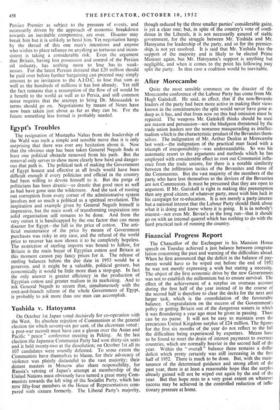Egypt's Troubles
The resignation of Mustapha Nahas from the leadership of the Wafd was such a simple and sensible move that it is only surprising that there was ever any hesitation about it. Now that the obvious step has been taken General Neguib finds at least one political obstacle removed from his path. But the removal only serves to show more clearly how hard and danger- ous that path is. The political task of making the Government of Egypt honest and effective at all levels would have been difficult enough if every politician and official in the country had been willing to devote himself to it. But the purge of politicians has been drastic—so drastic that good men as well as bad have gone into the wilderness. And the task of rooting out corruption from every corner of the administrative system involves not so much a political as a spiritual revolution. The inspiration and example given by General Neguib himself is impressive, but the main work of transforming inspiration into solid organisation still remains to be done. And from the very outset it is handicapped by the one factor-that can mean disaster for Egypt—the fall in the price of cotton. The arti- ficial maintenance of the price by means of Government purchases was risky in any case, and the refusal of the world price to recover has now shown it to be completely hopeless. The restriction of sterling imports was bound• to follow, for Britain is the main buyer of Egyptian cotton and Britain at this moment cannot pay fancy prices for it. The release of sterling balances before the due date in 1953 would be a generous, and it might be a valuable, political gesture, but economically it would be little more than a stop-gap. In fact the only answer is greater efficiency in the production of Egyptian cotton and greater realism in its marketing. And to ask General Neguib to secure that, simultaneously with the root-and-branch reform of the whole Government of Egypt, is probably to ask more than one man can accomplish.


































 Previous page
Previous page